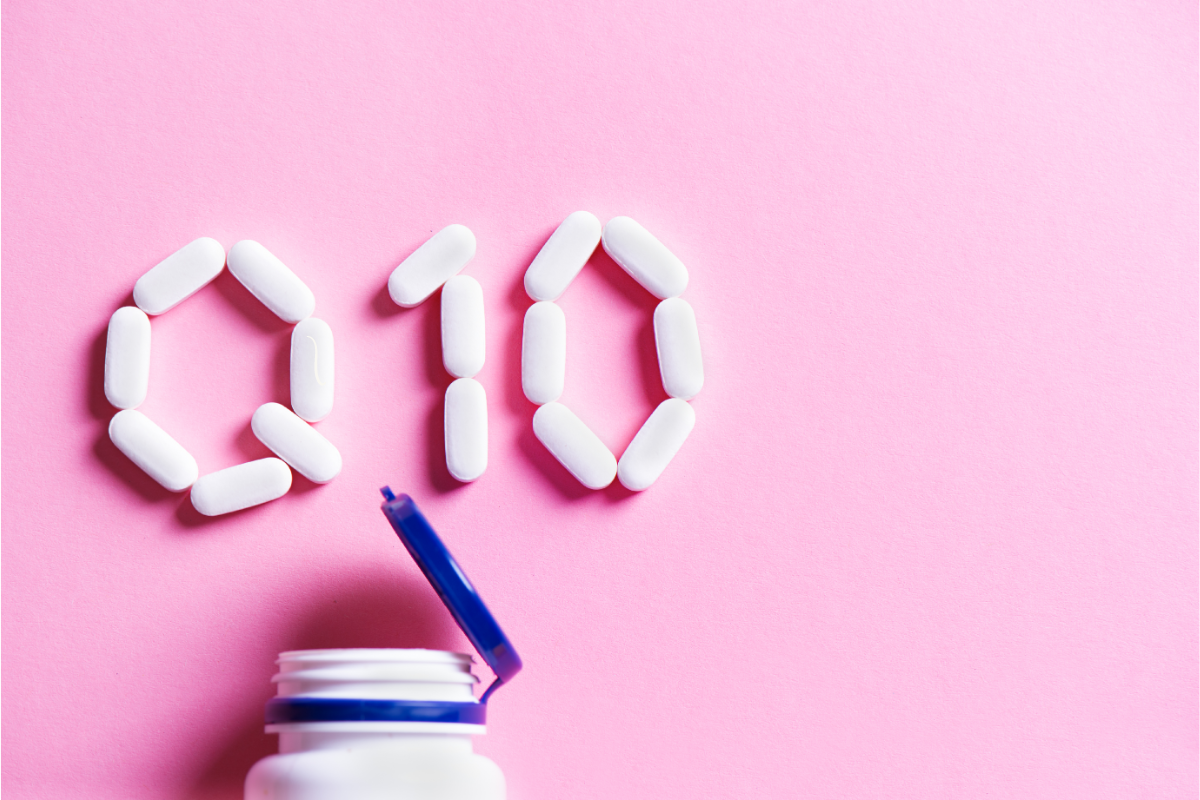Coenzyme Q10 (CoQ10) is a compound naturally present in the human body, essential for the production of cellular energy. It plays a crucial role in maintaining health and preventing premature ageing.
What is coenzyme Q10?
Coenzyme Q10 is a fat-soluble molecule present in all the body’s cells, mainly in the mitochondria.
It plays a crucial role in the electron transport chain, a vital process for the production of ATP (adenosine triphosphate), the main source of energy for cells.
The benefits of Coenzyme Q10
Anti-ageing effects
CoQ10 is widely recognised for its anti-ageing properties. As a powerful antioxidant, it helps neutralise free radicals, reducing the oxidative damage responsible for skin ageing. Studies show a significant improvement in elasticity and wrinkle reduction in people taking CoQ10 supplements.
Cardiovascular health
Cardiovascular health is another area where CoQ10 plays a vital role. It helps protect the heart by improving mitochondrial function and reducing oxidative stress. Clinical research has shown that CoQ10 supplementation can improve the symptoms of heart failure and reduce the risk of cardiovascular disease.
Biohacking and performance
In the field of biohacking, CoQ10 is used to increase energy and physical performance. By improving ATP production, it enables athletes and biohackers to maximise their endurance and physical capacity. CoQ10 supplements are often incorporated into biohacking diets for their beneficial effects on vitality and performance.
Brain health
In addition to its effects on Parkinson’s disease, CoQ10 shows promise in the prevention and management of other neurodegenerative diseases such as Alzheimer’s disease. Studies indicate that CoQ10 can reduce brain inflammation and improve cognitive function by protecting neuronal cells from oxidative stress.
Immunity
Recent research has shown that CoQ10 can play a crucial role in boosting the immune system. By increasing cellular energy, CoQ10 helps optimise immune cell function, particularly in the elderly, contributing to better resistance to infection.
Diabetes
CoQ10 is beneficial for people with type 2 diabetes. By improving insulin sensitivity and reducing blood glucose levels, CoQ10 can help manage diabetes and reduce the risk of associated cardiovascular complications.
DNA repair
Emerging research suggests that CoQ10 may play a key role in DNA protection and repair. By reducing oxidative damage, CoQ10 helps to prevent cell mutations and support cell longevity, thus contributing to the prevention of various chronic diseases.
What foods are rich in Q10?
CoQ10 is found naturally in a variety of foods, including red meat, oily fish and certain vegetables such as spinach and broccoli. However, dietary levels may not be sufficient for therapeutic effects, hence the interest in Q10-based food supplements.
Recommended dosage of Coenzyme Q10
The recommended dosage of coenzyme Q10 varies according to individual needs, state of health and specific treatment goals. Clinical studies and expert recommendations provide guidance on suitable dosages for different therapeutic and general well-being uses.
For general use and prevention of CoQ10 deficiency, a typical dosage is between 30 and 100 mg per day. This dosage is generally sufficient to maintain adequate levels of CoQ10 in the body, particularly for healthy individuals without specific medical conditions.
Heart failure and cardiovascular disease:
Patients with congestive heart failure or other cardiovascular diseases may benefit from higher doses, often between 100 and 200 mg per day. In some cases, doses of up to 300 mg a day may be prescribed under strict medical supervision.
Neurodegenerative diseases:
For neurodegenerative diseases such as Parkinson’s disease, doses of 200 to 300 mg per day are commonly used in clinical studies to improve mitochondrial function and reduce oxidative stress.
Physical performance and biohacking:
Athletes and biohackers often use doses of 100 to 200 mg per day to improve endurance and physical performance. These doses optimise energy production at cellular level.
Precautions and contraindications
Although CoQ10 is generally well tolerated, it can cause minor side effects such as digestive problems. It is crucial to consult a healthcare professional before starting any new supplement, especially for people taking anticoagulants or other medication.
Source:
- Journal of Cardiovascular Pharmacology
- American Heart Association
- Journal of Clinical Lipidology
- National Institutes of Health (NIH)
- Neurology and Neurotherapeutics Studies
- Parkinson’s Disease Research
- Journal of Sports Sciences
- International Society of Sports Nutrition
- Clinical Nutrition
- Mayo Clinic





